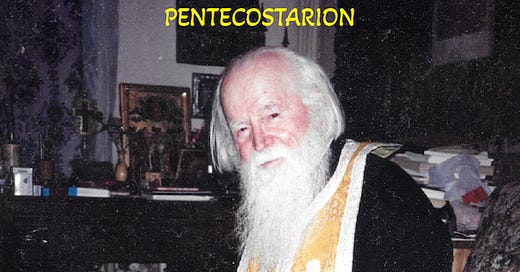A fragment from the Homily on Confession, for the Friday of the first week of Great and Holy Lent, by St. Sofian of Antim Monastery - from the book “Repentance and Resurrection - Homilies during the Triodion and Pentecostarion” now available at St. George Press.
Two enemies appear in people’s lives when they are held accountable for their evil deeds: shame and fear—shame of being scorned and fear of being discovered and punished. These enemies have been present in the conscience of the first people, and they are present in our conscience when we think of approaching the sacrament of confession, the sacrament of forgiveness of sins. Although we sin and load ourselves daily with many sins, done in word, deed, or thought, we allow time to pass, years pass and for many, their entire life passes without them unburdening the weight of their sins and without washing away the darkness that settles on the blameless garment of sanctity within that was received at the time of baptism. This slag, this heavy ballast, closes the pores of our inner sensitivity and we are no longer able to breathe “spiritual” air, becoming like barren and dry soil, as the psalmist says, that cannot sprout any holy thoughts, zeal, or fruit of heavenly things. (Ps 62:1 LXX: “O God, my God, I cry to thee early; my soul has thirsted for thee: how often has my flesh longed after thee, in a barren and trackless and dry land!”) We are no longer able to believe in God; we can no longer truly love people or God. Hidden and unconfessed sins are like mice that eat at the roots of our good deeds that we may have. And in their place, evil deeds sprout and grow within us, with all of their miserable consequences for our life here and the one beyond. Here they embitter our life and estrange us from God, but beyond the grave, our evil deeds will accuse us on the Day of Judgement like terrible demons. And we will not be able to escape them, as St. Ephraim the Syrian says (see St Ephraim the Syrian, Eschatological Hymns and Homilies (SAGOM Press: 2019) Our good deeds will be like good angels, but our bad deeds will be like fallen angels. They cling to us like burrs and say: “we are yours; you made us!” And if the evil deeds are more numerous, we are lost. If there are more good angels, more good deeds, God helps us, and in the balance of His righteousness and love, we escape the punishment, the condemnation about which the Holy Scripture continually warns us.
Our sinful nature urges us to conceal our sins, and the devil brings his own contribution. Saint John Chrysostom says the devil hides people’s shame when they want to sin, but after they commit the sin, he reminds them that they need to be ashamed of what they have done so that they do not scandalize their spiritual fathers, before whom they must appear good and honest. But this consideration is a great mistake and, and a great deceit, brothers and sisters in Christ, because it is good to be ashamed before others and to fear God when we commit a sin, or before committing a sin, but not after we have committed it. Because what shame is there in wanting to be free of an illness and to show yourself to the doctor as you are, wishing to be healed? What shame is there in wanting to wash the impurities from your soul, to stop serving the devil and start serving God? Did the great Prophet David lose his honor when he publicly confessed his sin in Psalm 50, or the Holy Apostle Paul, or Mary Magdalene, or the blessed Augustine, or Mary of Egypt, or other great sinners who publicly declared themselves to be great sinners, by confessing their sins? On the contrary, they are great before the entire world and saints before God because of their courage and sincerity in confessing their mistakes and transgressions.







Book ordered, thanks!